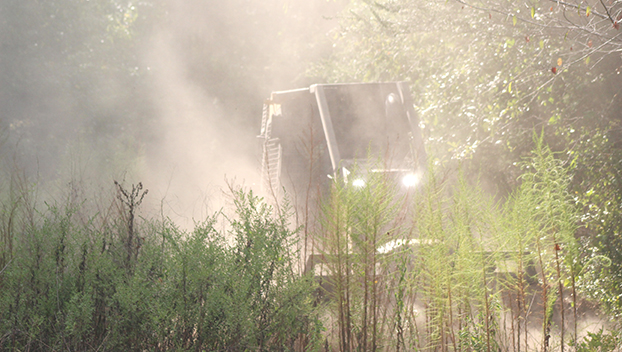Appropriations bills set targets for Forestry Commission, Department of Wildlife
Published 10:42 am Tuesday, March 12, 2024

- A dozer cuts a fire lane through a haze of smoke while fighting a wildfire in Lincoln County in September 2023. Dozers are one tool used by Mississippi Forestry Commission fire fighters and US Forest Service Firefighters to contain wildfires. (Hunter Cloud | The Daily Leader)
JACKSON — A pair of appropriation bills introduced in the Mississippi House of Representatives would set performance targets for managing natural resources. The bills were referred to the Appropriations A and B committee in the house Tuesday.
House Bill 1780 would appropriate $15,729,963 in funding to the Mississippi Forestry Commission from the state general fund. An additional $12,603,954 is appropriated from a special fund for the commission.
HB1780 directs that $250,000 should be deposited in a Forest Improvement Revolving Fund in the state treasury for the reforestation and growth improvement of forests, woodlands, and publicly owned lands of the state, including sixteenth section lands, Camp Shelby, Columbia Training School and colleges and universities.
The bill additionally sets performance targets for the Forestry Commission. One of the targets is the average time of suppression for a burn from detection to control, FY2025 target will be an average of two hours.
The goal for MFC’s prescribed fire program is 15,000 acres. The percentage of fires suppressed at less than 100 acres should be 95 percent. Under the Forest Resource Development Program, 35,000 acres are to be regenerated or improved.
MFC shall monitor 19.8 million acres for insects, storm and disease damage. 20 percent of state forest lands per region should be inventoried and there should be a 20 percent increase of inventoried state forest land.
A report of their performance is required in the legislative budget request needed for FY2026.
MDWFP funding
House Bill 1791 would appropriate $9,663,903 out of the State General Fund to the Department of Wildlife, Fisheries and Parks. An additional $73,726,167 would be appropriated out of a special fund for the MDWFP. Excise taxes on gas and oil raised $5.75 million to be appropriated to the MDWFP.
Performance targets for FY2025 under the bill would include 480,000 hunting and fishing licenses sold, 52,000 boats registered and a one percent increase in licenses sold. MDWFP’s Fisheries Bureau has a goal to stock 1.5 million fish for public waters, have 1.5 million visitors to MDWFP lakes, 1.5 million participants in aquatic education and 35 access facilities such as boat ramps to be built or maintained.
Wildlife bureau has a goal to manage for 125,000 man days, six research projects to sustain healthy and abundant wildlife projects, 1,000 acres of forestry inventory, 30,000 acres of prescribed fire, waterfowl management and timber management on WMAs to sustain healthy and abundant wildlife.
The Law Enforcement bureau has a goal of 10,000 hunter education participants, 175,000 hours patrolling on land, 50,000 hours patrolled on water, 8,000 criminal investigations, 1,500 shooting sport programs, limit boating accidents to 50, and limit boating fatalities to 7. The cost per student for the hunter education program should be $50 and the cost for shooting sports program shall be $525.
Parks bureau has a goal of 250,000 overnight accommodations for cabins, 650,000 for camping and 400,000 day use services. Mississippi’s Natural Science Museum has a goal of 80,000 visitors to exhibits and 60,000 natural heritage records entered.
HB1791 directs that $400,000 is used for the detection and prevention of Chronic Wasting Disease. A majority of those funds are used to test for the disease.





